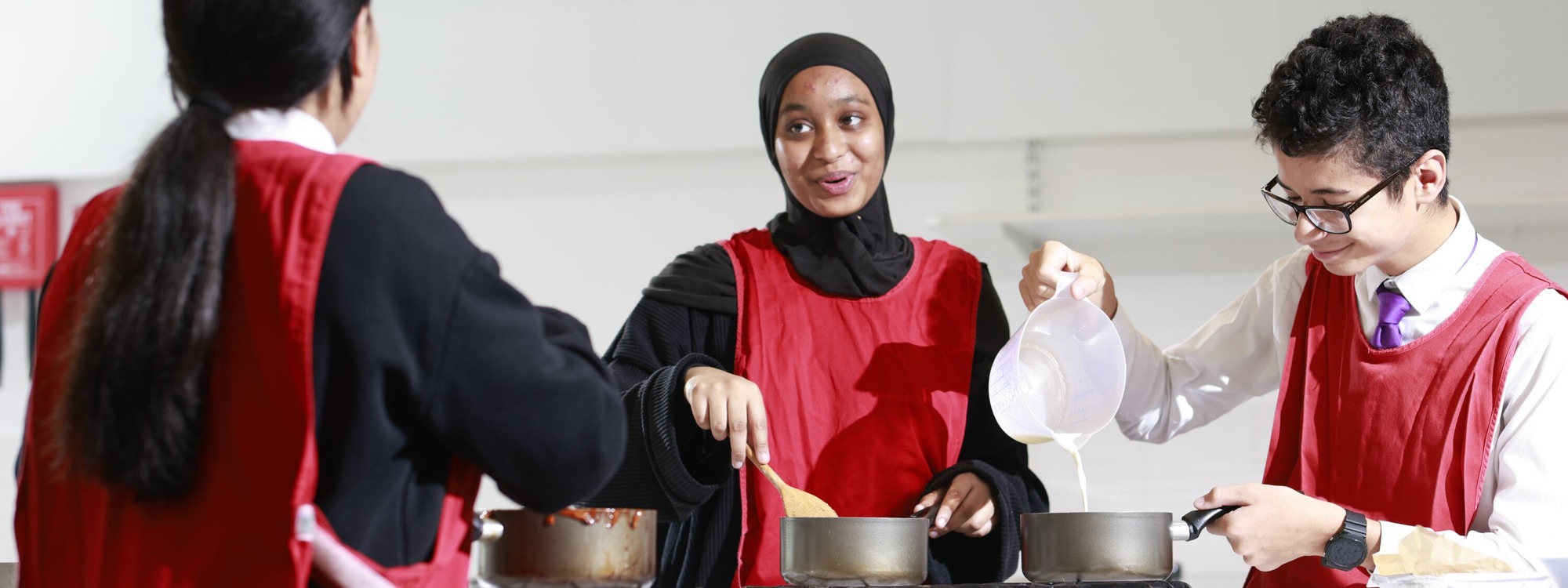Food and Nutrition
The curriculum in cooking helps our students to understand the principles of food preparation, food science and nutrition. This enables them to make healthy decisions regarding food choices, recognise the importance of a balanced diet and be able to cook for themselves.
KS3
In Year 7, we study basic nutrition through the Eatwell Guide. We introduce students to the meaning of a balanced diet and health and safety in the cooking environment. We also cook dishes, by introducing recipes which use basic cooking skills. Towards the end of the year, all pupils complete a food project where they have to research, cook and evaluate a particular dish fitting a design brief.
In Year 8, we study nutrition in more depth by focusing on the functions of macro/micronutrients. We also investigate food related illnesses and how to prevent these. Social, political and environmental issues connected with food and its production are also studied by learning about food waste, food miles, GM foods and food sustainability. All year 8 pupils complete a food project where they have to research, cook and evaluate a particular dish fitting a design brief.
In Year 9, we focus on food science by investigating the function of ingredients in cake-making. How do carbohydrates change when exposed to heat? How do proteins change when exposed to heat, acid and agitation? What types of heat transfer occurs when cooking food? We also study special diets such as veganism, vegetarianism and other factor that may impact food choices. All Year 9 pupils complete a food project where they have to research, cook and evaluate a particular dish, fitting a design brief. However, the brief for this year group is significantly more comprehensive.
KS4
At Key Stage 4, students can study a GCSE in Food Preparation and Nutrition. This is an extensive course in which our students focus on the principles of nutrition, diets and good health and the science of cooking food. The course also includes the following topics: cultures and cuisines around the world, factors affecting food choice and food provenance. We also learn about food commodities such as fruit & vegetables, dairy products, meat, fish, poultry, alongside vegetarian and vegan alternatives to meat, fish and dairy. In Year 11, all students conduct two practical exams as well as a written exam.
Curriculum Maps
Knowledge Organisers
Year 11
Homework Details
'You said, we did'
AUTUMN TERM
TERM 1
Food and Nutirition - Homework Timetables - Year 7 to 11
TERM 2
Food and Nutirition - Homework Timetables - Year 7 to 11
SPRING TERM
TERM 1
Food and Nutirition - Homework Timetables - Year 7 to 11
TERM 2
Food and Nutirition - Homework Timetables - Year 7 to 11
SUMMER TERM
TERM 1
Food and Nutirition - Homework Timetables - Year 7 to 11
TERM 2
Food and Nutirition - Homework Timetables - Year 7 to 11
Contact Food and Nutrition
Do you need assistance from a member of staff?
We have a team of talented, motivated staff who help deliver the best possible education to each of our students.

